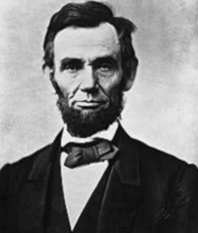

In a very real sense, Lincoln's greatest legacy to the people of the United States of America was -- the United States of America itself. He saved the Union. In the hands of a weaker, less politically astute or less wise President, the nation would have been torn apart. It is not hard to imagine the divisions going past the loss of the Southern states. In the darkest days of the war, there was in fact talk of the Midwestern states getting out of the war by getting out of the country, and breaking away to form a Northwestern Confederation. The war-time mayor of New York considered the possibility of taking his city out of the Union. With a hostile Confederacy on its long southern border, and a less-than-friendly British Canada to the north, it might well have been difficult or impossible for the Union to hold onto the new Pacific states of California and Oregon, or the various western territories (some portions of which were claimed by the Confederacy). Even if the United States had lost no more territory, it would be greatly weakened in many way by the loss of the Confederate states. France and Great Britain, the great powers of the day, would very likely have proved quite friendly to a Confederacy eager to sell them cotton and raw materials. The Confederates, in turn, would be glad to buy French and British industrial goods, instead of buying from the North. If the Confederates viewed the Union as a rival, so did the European powers. They would have been glad to see the North weakened. Lincoln's war leadership prevented all of that.
It is rarely discussed, but since the Confederacy was established on the basis of the right to secede, it would have likely found it difficult to keep hold of any states that chose to break away. It's easy to imagine, say, Texas and Florida deciding to go their own ways. The United States could have broken up into perhaps a half-dozen or more squabbling statelets, more "Balkanized" than the Balkans. Federalist Paper #9, written in the 18th century to urge the ratification of the U.S. Constitution, imagined the country broken up into "into an infinity of little, jealous, clashing, tumultuous commonwealths, the wretched nurseries of unceasing discord, and the miserable objects of universal pity or contempt." That could well have happened in the 19th century, if not for Lincoln.
Before Lincoln, the Presidential or executive branch was often seen as the junior partner among the three branches of government, there to do what Congress told it to do -- to execute the laws they established. Under Lincoln, the power and authority of the presidency were expanded in ways that still affect us all -- usually, if not always, for the good.
But he did more than preserve the Union and strengthen the executive. He changed the country in dramatic ways, and left the Federal level of government as a whole vastly more powerful -- and the state governments significantly weakened. As been often noted, before the Civil War, people treated the term "The United States" as a plural: They would say "The United States are important." After the war, people would say "The United States is important." The national motto, E Pluribus Unum, "Out of Many, One," had become a statement of fact, and not a far-off goal.
There was one other statement, an even more important one, that grew a lot closer to true under Lincoln. The Declaration of Independence says "We hold these truths to be self-evident, that all men are created equal, that they are endowed by their Creator with certain unalienable rights, that among these are life, liberty and the pursuit of happiness. " By breaking the power of slavery forever, Abraham Lincoln led us on our way as We, the People, took important and painful steps forward on the way to treating all men as equals.